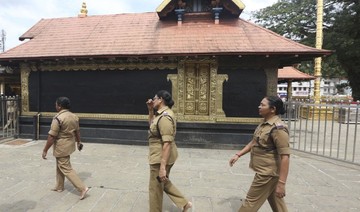PATHANAMTHITTA, India: Tens of thousands of pilgrims thronged one of Hinduism’s holiest temples in southern India Saturday as it reopened amid high security, but women aged between 10 and 50 were absent despite a court order allowing them to enter.
Hindu activists meanwhile imposed a strike to protest that the security measures were impeding their ability to worship at the Sabarimala shrine, closing shops and reducing traffic to a trickle.
India’s Supreme Court ruled in September that all females, including those of menstruating age, could enter the shrine perched in a tiger reserve in the southern state of Kerala.
But when the temple reopened for several days last month, Hindu hard-liners clashed with police, assaulted journalists and prevented the court order from being implemented.
With thousands of extra riot police on duty and police barricades set up, the hilltop temple reopened late on Friday a day ahead of the start of a Hindu festival period.
Among the several hundred thousand people who have registered to pray at the temple over the coming weeks are around 700 women, setting the stage for a major showdown.
However, no women have yet tried to approach the site ahead of a hearing next week at the Supreme Court of a motion announced late Friday by the board managing the temple site.
It aims to ask the court, likely on Monday, to allow more time to admit women, citing the lack of infrastructure following major floods in August, a spokesman told AFP.
On January 22 the Supreme Court will also hear challenges to its original September ruling, one of a series of recent liberal decisions including the decriminalization of gay sex and of adultery.
One woman who did want to get to Sabarimala on Friday was activist Trupti Desai.
But a crowd of around 500 people staged a sit-in and prevented her from leaving Kochi airport and late Friday she and several women companions flew back to Mumbai, Indian media reported.
“We tried to hire taxis several times but the agitators are not allowing them to take us. They have threatened violence if they do,” Desai told Indian television.
Separately late Friday police arrested another woman, K.P Sasikala, a local community leader, for seeking to defy a ban on spending the night at the temple site.
Sasikala is over 50 so Hindu organizations are not opposed to her entering the site.
Instead they were incensed that restrictions were being imposed on pilgrims and called the local strike for Saturday.
“Hindu community leaders called for the strike and we support it,” P.S Sreedharan Pillai, the local president of Prime Minister Narendra Modi’s Hindu nationalist Bharatiya Janata Party (BJP) told AFP.
“The police are putting restrictions on devotees who want to go there and pray,” Pillai added.
A few protesters pelted stones at public buses on the roads in some parts of the state, a Kerala police official told AFP.
Local media reports said about 2,000 protesters gathered around a police station in Pathanamthitta district, 65 kilometers (40 miles) from the temple, where Sasikala was being held.
“Sasikala was detained as the police had instructed that devotees will be not allowed to stay around the temple at night, which she insisted,” Kerala police spokesman Pramod Kumar told AFP.
Women activists say the ban on women between 10 and 50 at Sabarimala reflects an old view that connects menstruation with impurity.
They argue that women are allowed in most Hindu temples and the practice at Sabarimala is part of their tradition, and not anti-women.














